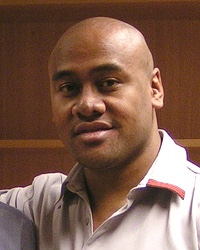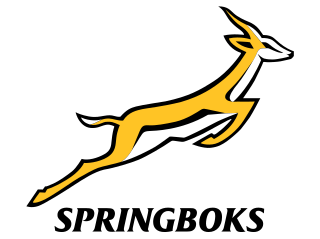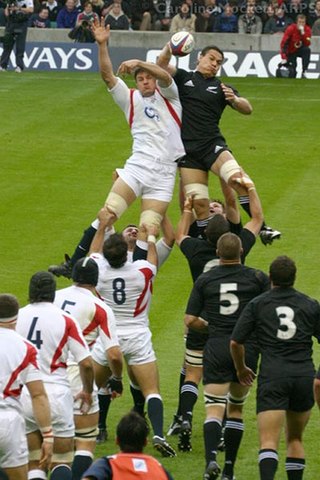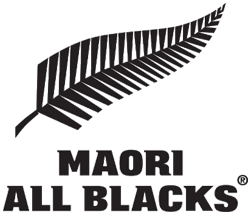Related Research Articles

The New Zealand national rugby union team, commonly known as the All Blacks, represents New Zealand in men's international rugby union, which is considered the country's national sport. Famed for their international success, the All Blacks have often been regarded as one of the most successful sports teams in history.

Jonah Tali Lomu was a New Zealand professional rugby union player. He is widely regarded as one of the greatest and most influential players in the history of the sport, and as one of the most talented sportsmen ever. Lomu is considered to have been the first true global superstar of rugby, and consequently had a huge impact on the game.

The South Africa national rugby union team, commonly known as the Springboks, is the country's national team governed by the South African Rugby Union. The Springboks play in green and gold jerseys with white shorts, and their emblem is the Springbok, a native antelope and the national animal of South Africa. The team has represented South African Rugby Union in international rugby union since 30 July 1891, when they played their first test match against a British Isles touring team. Currently, the Springboks are the reigning World Champions, having won the World Cup a record four times. South Africa have won half of the Rugby World Cups they have participated in and are also the second nation to win the World Cup consecutively.

The National Provincial Championship (NPC) is an annual round-robin rugby union competition in men's domestic New Zealand rugby. First played in 1976, it is the second highest level of competition in New Zealand alongside the Ranfurly Shield. It is organised by New Zealand Rugby (NZR) and since 2021, it has been known as the Bunnings NPC after Bunnings, its naming rights sponsor. A concurrent women's tournament is also held, the Farah Palmer Cup.

New Zealand Rugby (NZR) is the governing body of rugby union in New Zealand. It was founded in 1892 as the New Zealand Rugby Football Union (NZRFU), 12 years after the first provincial unions in New Zealand. In 1949 it became an affiliate to the International Rugby Football Board, now known as World Rugby, the governing body of rugby union for the world. It dropped the word "Football" from its name in 2006. The brand name New Zealand Rugby was adopted in 2013. Officially, it is an incorporated society with the name New Zealand Rugby Union Incorporated.

Hamilton Boys' High School is a boys' secondary school in Hamilton, New Zealand and is the largest secondary school in the Waikato region. The school was established as Hamilton High School in 1911 but was later split into separate boys' and girls' schools, with the current school opened in February 1955. Its sister school is Hamilton Girls' High School. The school crest features a lion, sash and star, and bears the motto "Sapiens Fortunam Fingit Sibi" which translates to "a wise man carves his own fortune". The school colours are black and red.
The All Blacks XV is the second national rugby union team of New Zealand, after the All Blacks. New Zealand's second national team has had numerous names in its history: Junior All Blacks, New Zealand XV, New Zealand A, New Zealand B, All Blacks XV.

Rugby union has been played in New Zealand since 1870 and is the most popular sport in the country as well as being its national sport. In a 2023 survey, 75% of respondents said they followed the sport.
Jaffray may refer to:

The Māori All Blacks, previously called the New Zealand Maori, New Zealand Maoris and New Zealand Natives, are a rugby union team from New Zealand. They are a representative team of the New Zealand Rugby Union, and a prerequisite for playing is that the player has Māori whakapapa (genealogy). In the past this rule was not strictly applied; non–Māori players who looked Māori were often selected in the team. These included a few Pacific island players and a couple of African descent. Today all players have their ancestry verified before selection in the team.
The South Canterbury Rugby Football Union (SCRFU) is a rugby province based in the central South Island city of Timaru, New Zealand. The South Canterbury team play at Fraser Park located in Timaru.

The New Zealand Under 19's rugby team was a team for players aged under 19 as a platform to the All Blacks. The New Zealand Under 19's have joined forces with the New Zealand Under 21s to make the new team New Zealand Under 20s for the all new IRB Junior World Championship, which commenced in 2008.
In 1977 the British Lions rugby union team toured New Zealand. The Lions played 26 matches, including four internationals against the All Blacks. They lost the series against the All Blacks by three matches to one. The team played as the British Isles in their internationals against the All Blacks and the British Lions for the non-international games. Unlike all previous tours to New Zealand, the Lions did not play any matches in Australia, though one game was also played at Buckhurst Park, Suva, against Fiji.

The New Zealand national under-20 rugby union team, nicknamed the Baby Blacks, is the representative rugby union team from New Zealand. It replaced the two former age grade teams, the under-19s and the under-21s. Their first tournament was the 2008 IRB Junior World Championship, which they won after defeating England (38–3) in the final. They have gone on to also win the World Rugby Under 20 Championship in 2009, 2010, 2011, 2015 and 2017. The New Zealand under-20s have been nicknamed the "Baby Blacks" after the youthful All Blacks side which played in 1986.
In 1978 the New Zealand national rugby union team, the All Blacks, toured Britain and Ireland. They were the eighth All Black team to undertake a full tour of the countries and became the first to achieve a Grand Slam by beating the national teams of Ireland, Wales, England and Scotland. The previous seven touring teams had either lost or drawn at least one international, or had not played all four nations.
The 1979 France rugby union tour of Fiji New Zealand Tahiti was a series of ten matches played in June and July 1979 by the France national rugby union team in Fiji, New Zealand and Tahiti. The team won seven matches and lost three, including defeats to provincial teams Waikato and Southland. They drew their two-match test series against New Zealand national rugby union team, losing the first test but winning the second. The victory in the second test was France's first away victory against New Zealand, gained at the eighth attempt.
The 1976 New Zealand rugby union tour of South America was a series of eight matches played by the New Zealand national rugby union team in Uruguay and Argentina in October and November 1976. The tour was entirely successful as the New Zealand team won all nine matches, scoring a total of 321 points with 72 conceded.
The 1960 New Zealand rugby union tour of South Africa, was a series of rugby union matches played by the New Zealand national rugby union team in South Africa and Rhodesia.
John Lyndon Jaffray is a former New Zealand rugby union player. A first or second five-eighth, Jaffray represented Otago and South Canterbury at a provincial level, and was a member of the New Zealand national side, the All Blacks, between 1972 and 1979. He played 23 matches for the All Blacks including seven internationals.
References
- ↑ Knight, Lindsay. "Merv Jaffray". New Zealand Rugby Union. Retrieved 3 October 2014.